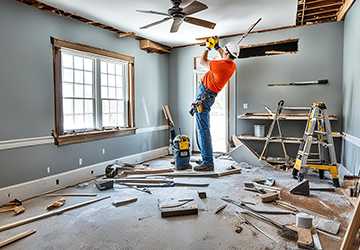
Evaluating the Appropriate Timing for Renovating Your Investment Real Estate
Nouman
Renovating an investment property requires a thorough inspection of its current state. Before you begin renovations, conduct a comprehensive inspection to identify areas that need repair or improvement. Look for structural defects, outdated systems, and damaged finishes. Addressing these issues can increase the property's value and attract higher-paying tenants.

Determine the Best Time to Renovate a Property
Timing is critical to the success of an investment property renovation. Understanding market fluctuations and seasonal factors can help determine the best time to renovate a property.
Market Trends
Renovations are most effective when property values are rising. A booming market can result in a higher return on investment. Conversely, significant renovations may yield less financial benefits during a market downturn than expected.
Seasonal Factors
Certain seasons are more conducive to certain types of renovations:
- Spring and Summer: Great for outdoor landscaping, roofing, and painting projects.
- Fall and Winter: Great for interior renovations such as kitchens and bathrooms.
Top Property Renovation Tips
Strategic planning and execution are essential when renovating an investment property. Here are some critical property renovation tips to help you optimize your investment.
Prioritize High-Impact Renovations
Focus on renovations that provide the highest return on investment. For example, kitchen and bathroom renovations can significantly increase a property's value and appeal. Updating fixtures, cabinets, and countertops can modernize these spaces and attract tenants or buyers.
Smart Budgeting
Carefully craft a budget that includes all potential expenses. Budget for unforeseen costs that may arise during the renovation process. Sticking to a budget will help avoid financial imprudence and ensure the investment is profitable.
Hire Highly Qualified Experts
Hiring skilled artisans and avant-garde designers guarantees superior craftsmanship and strict compliance with building regulations. Their extensive expertise can also provide sophisticated solutions and unusual design ideas that enhance the property's appeal and aesthetic excellence.
Sustainable Renovations
Incorporate sustainable practices to increase property value and attract environmentally conscious tenants. Use energy-efficient appliances and eco-friendly materials, improve insulation, and reduce energy consumption.
Increase Appeal
First impressions are crucial. Improving a property's appeal can significantly impact its ability to attract potential tenants or buyers. Consider landscaping, exterior painting, and siding upgrades to create a visually appealing exterior.
Use High-Quality Components
Allocating funds to quality materials during renovation ensures longer life and strong resilience. Despite the significant initial outlay, long-term benefits include reduced maintenance costs and increased asset value.
Coordinate Renovations with Tenant Changes
If your property is already rented, you can minimize disruption and rental losses by coordinating renovations with tenant changes. Plan significant renovations while the property is vacant to avoid inconvenience for existing tenants.
Communicate with Tenants
If renovations must occur while tenants occupy the property, maintain open communication. Inform them of the renovation plans, expected disruptions, and any temporary arrangements.
Lease Agreement
Include a clause in the lease that sets out the landlord's rights to carry out necessary renovations. This ensures that tenants know the possible work and can plan accordingly.
Monitor Renovation Progress
Carefully monitor the progress of the renovation project to ensure it meets the established timeline and financial constraints. Arrange systematic site inspections and discuss with the contractor to address any potential anomalies.
Progress Checkpoints
- Initial assessment and planning
- Project evaluation mid-project.
- Final inspection before project completion.
Benefits of Renovating an Investment Property
There are many benefits to renovating an investment property, such as increasing your financial returns and the value of your property.
Increased Property Value
A well-planned renovation can increase your property's appraised value exponentially. Contemporary, improved, and modernized properties are more attractive to potential buyers and tenants, resulting in higher transaction prices or higher rental income.
Increased Rental Income
A renovated building can generate higher financial income, providing a better economic return. Modern amenities, upscale furnishings, and an improved exterior can result in higher rental values.
Higher Tenant Satisfaction
Improvements that enhance the living environment and increase the property's value can result in higher tenant satisfaction. Satisfied tenants are more likely to extend their leases, reduce vacancy rates, and ensure that income continues to flow in.
Avoid Common Renovation Traps
Avoid common traps that can lead to financial imprudence and delays to ensure the success of your remodelling project.
Over-Renovation
While updating and modernizing are essential, over-renovation can result in diminishing returns. Avoid excessive improvements that may not justify the property's market value.

Ignoring Legal and Regulatory Requirements
Ensure that all renovations comply with local building codes and legal requirements. Obtain necessary permits in advance to avoid legal disputes and financial penalties.
Inefficient Project Management
Skilled project management is essential to meeting schedule and financial constraints. Work diligently with contractors and set clear expectations to avoid misunderstandings and delays.
Strategic Planning for Renovations
Renovating an investment property requires a careful strategy to achieve the best results.
Detailed Feasibility Analysis
Conduct a thorough feasibility analysis before beginning any renovation. Evaluate the potential financial benefits versus the planned expenses.
Collaboration with Stakeholders
Relevant stakeholders, including investors, property managers, and contractors, should be involved in planning. Work together to ensure the renovation fits the overall investment strategy and considers all relevant issues.
Best Seasons for Certain Renovations
Renovations in Spring and Summer
Horticultural Improvements: Spring and summer are best for plant cultivation and landscaping. New plants and greenery can flourish and improve the property's visual appeal.
- Exterior Coloring: Hot, dry weather conditions are ideal for exterior paint applications, ensuring excellent adhesion and durability.
Fall and Winter Renovations
- Interior Renovations: The colder months are conducive to interior renovations, such as upgrading kitchens and bathrooms. Tradespeople are often less burdened, potentially reducing labour costs.
Improving Thermal Efficiency: In the fall, improving insulation in windows, entry porches, and attics can prepare for winter heat preservation.
Use Renovation Incentives
Government Grants and Rebates
Explore government grants and rebates available for investment property renovations. Many programs offer financial incentives for energy-efficient upgrades and sustainable practices, which can reduce the overall cost of a renovation.
Tax Deductions
Certain renovation expenses may be tax-deductible. Consult a tax advisor to clarify which expenses qualify and how to optimize these deductions to increase the tax benefits of your investment.
Conclusion
Renovating an investment property is a strategic endeavour designed to increase value and attract high-paying tenants. You can maximize your return on investment by carefully evaluating the property's condition, determining the best time to renovate it, and following important property renovation tips. Adjusting renovations to tenant changes, monitoring progress, and avoiding common pitfalls are critical to the project's success. A well-planned renovation can ultimately increase property value, rental income, and tenant satisfaction.




